In 1930, a cheap lodging house and greasy-spoon diner named The Tub inhabited this building. The owner was Urbain Ledoux, who referred to himself as Zero. He offered 5-cent meals and 25-cents a night lodging to the area’s growing homeless population. A charitable man, Zero held an open house in April 1930 to celebrate Easter. Reports say that more then 5,000 “jobless men from the Bowery” dined on “mulligan stew, pie, and coffee.” Ledoux’s efforts to aid those who were down-and-out extended far beyond the confines of this building; all throughout New York City and beyond he made efforts to help the impoverished and the homeless.
Ledoux and The Tub popped up at more than one location during this time period, and met resistance every step of the way. The Tub was evicted from 17 St. Marks Place in 1924 due to non-payment of rent, and closed down by the board of health at year another location at 12 St. Marks Place in 1928.
The building was renovated in 1962, and from 1967-71 the storefront was occupied by Underground Uplift Unlimited (UUU), owned by LGBT civil rights pioneer Randy Wicker. UUU was a head shop that invented and produced iconic buttons and posted with slogans like “Make Love, Not War” and “More Deviation, Less Population.” UUU was the largest seller of protest pins in the country and sold hundreds of different political, social, and Vietnam protest pins for 25 cents each. The revenue from this store helped fund Wicker’s activism, which had included involvement with some of the earliest homophile organizations and staging some of the first protests for LGBT civil rights.
Block : 463 / Lot : 23 / Building Date : Unknown / Original Owner : Thomas E. Davis / Original Use : Residential/Commercial / Original Architect : Unknown


Do you know this building? Please share your own stories or photos of this building here!